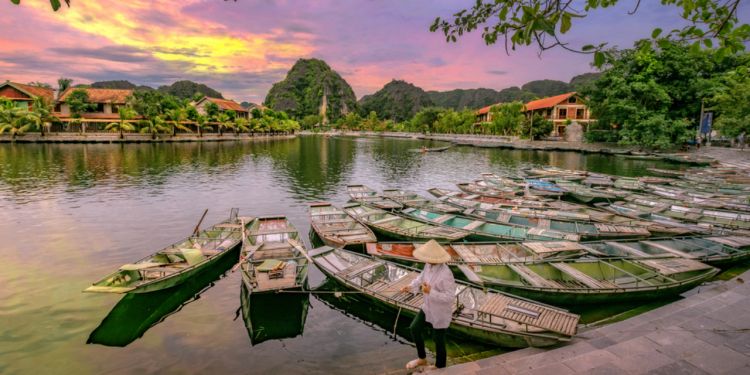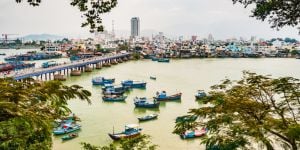
Vietnam does not have a digital nomad visa and does not support welcoming tourists under a digital nomadic umbrella. However, if you are planning to work remotely while on a holiday, you can enjoy the comfort of many coworking spaces and secure internet connection. Here's an overview of what you can expect if you're contemplating a move to Vietnam as a digital nomad.
What you need to know before entering Vietnam
The first thing to keep in mind is that Vietnam currently doesn't have a digital nomad visa, although it is a popular destination for digital nomadism. Therefore, moving there as a digital nomad requires proper consideration, especially in terms of visa and other paperwork.
The popular belief is that you can move to Vietnam as a digital nomad on a 3-month tourist visa upon arrival, regardless of your nationality. However, you are not officially allowed to work on a 3-month tourist visa, and doing so would violate the rules of the visa.
Citizens from 23 countries are exempt from the visa obligation and are allowed to stay for 15 or 45 days in Vietnam, depending on their nationality. These countries include Cambodia, Denmark, Finland, France, Germany, Indonesia, Italy, Malaysia, Singapore, Spain, Sweden, and the U.K. Other countries are eligible to apply for an E-visa, granting entry to the country for 30 or 90 days. If you are unclear which visa you should apply for, consult your embassy or our article about Visas for Vietnam .
The Vietnam visa application is available online to citizens of every country on the official visa portal. Usually, the visa process takes 3-5 working days. For the E-visa application, expect a fee of $25 USD (30 days) or $50 USD (90 days).
Those who wish to extend their stay in Vietnam are required to leave the country upon the expiration of their visa and can reapply with a new entry. For more information, check Vietnam's official website.
Best Vietnamese cities to work and relax in
Commonly known as Saigon or abbreviated as HCMC, Ho Chi Minh City is the former capital and largest city in Vietnam with a population of over 9.5 million people, according to 2024 reports. The city is becoming a popular destination among digital nomads because of its affordability, good Internet speeds, and the ease of setting up camp.
The city is often praised for its entrepreneurial spirit and aggressive start-up scene. It manages to combine all the benefits of residing in an exotic destination with the motivation and drive of a big city. There is no shortage of places to hot desk for a few hours, and you'll be interacting with the vibrant young entrepreneurial crowd within the bountiful coworking spaces.
Vietnam's capital and the second largest city is Hanoi. Ranked as one of the world's top 10 destinations, it is frequently visited and offers lots of attractions as well as a developed business environment. The city is a mix of local traditions and international influence and provides a comfortable work environment with the expected amenities at a reasonable price.
There are plenty of coffee shops and coworking spaces to choose from, and with growing tourism, you will also have a wide range of options when it comes to accommodation. Hanoi is quieter than Ho Chi Minh when it comes to the nightlife, but offers many historical and natural attractions to explore, like Hoàn Kiếm Lake, the Vietnam Military History Museum and the Museum of Literature.
For those looking for a more laid-back beach lifestyle, Da Nang may be the perfect fit. It is the third-largest city in Vietnam, located right between Hanoi and Ho Chi Minh on the East Sea coast. The coastline is the main attraction. Look for My Khe Beach, the Son Tra peninsula, and Red Beach. Finding a place to work from is not a problem, and you will have a nice selection of local and Western coffee shops at your disposal.
Another coastal destination, less than an hour's drive away, is Hoi An. Just south of Da Nang, the city is home to beautiful beaches and UNESCO World Heritage Sites. Known as Vietnam's most atmospheric city, Hoi An offers more of a small-town feel with An Bang and Cua Dai beaches just a short drive from the city center.
The Internet and coworking spaces in Vietnam
As of December 2024, Vietnam's average Internet speed reached 86.96 Mbps, the highest ever recorded. It is firmly in the top 40 internet providers across the globe. Wi-Fi access is easily accessible by buying a coffee or lounging by your hotel pool. However, do not expect complimentary Wi-Fi near all tourist attractions.
Good to know:
Before choosing Vietnam as a potential temporary base, consider the traffic. The country's bigger cities will require you to be extra vigilant when crossing the road because of the large number of motorbikes rushing through the city's streets day and night.
Big cities boast a large number of coworking spaces. Plus, the region's pronounced coffee culture has ensured an abundance of coffee shops, both local and western, which offer a nice setting for work and rest.
Coworking spaces in Ho Chi Minh City
Tini Coworking, 152 Võ Văn Kiệt, Phường Nguyễn Thái Bình, Quận 1
WorkFlow, 39 Nguyễn Duy Hiệu, Thảo Điền,
Work Easy, 3 Nguyễn Lương Bằng, Tân Phú, Quận 7
The Hive Saigon, 94 Xuân Thủy, Thảo Điền, Quận
Coworking spaces in Hanoi
UP Coworking Space, Tầng 8, tòa nhà Hanoi Creative City, 1 Lương Yên
HanoiHub Coworking Space, 2nd Floor, No 2 Alley 59, Láng Hạ, Chợ Dừa, Ba Đình
Coworking spaces in Da Nang
DNC - Danang Coworking Space, 56 Lê Đình Dương, Chính Gián, Thanh Khê
cirCO Da Nang City Centre, 17 Quang Trung, Hải Châu 1
Coworking spaces in Hoi An
Hub Hoi An Coworking, 105 Lê Thánh Tông, Cẩm Sơn
Leisure in Vietnam
With its rich historical background and diverse landscapes, Vietnam has plenty of destinations within its borders to explore when work is over! Pick a spot for happy hours, head to the beach for a sunset, or visit a museum before a dinner reservation. The food is an attraction in itself, and Vietnamese cuisine is regarded as one of the healthiest in Asia. Taking a cooking class is a popular and practical pastime. Big cities offer a vibrant nightlife with an excellent choice of bars and clubs, while smaller towns charm with their laid-back lifestyle and lush greenery.
We do our best to provide accurate and up to date information. However, if you have noticed any inaccuracies in this article, please let us know in the comments section below.








